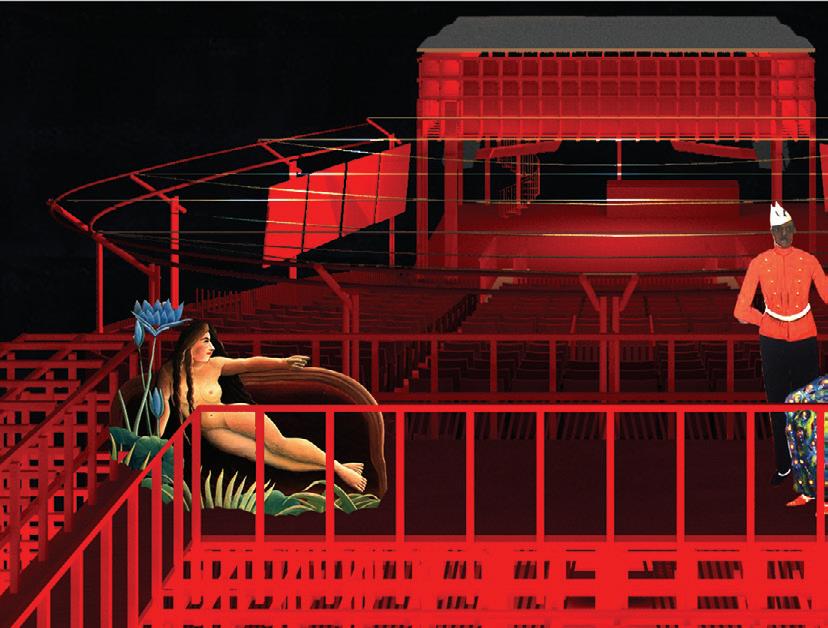
3 minute read
Opéra Waitaká
Leonardo Serrano Fuchs Rio de Janeiro, Brazil
Opéra Waitaká reconnaît le passé impérial de l’opéra pour off rir de nouvelles possibilités. L’opéra du passé a été utilisé par les puissances coloniales comme point de repère de la domination et de la propriété du sol. Apprenant des peuples nomades comme les berbères d’Algérie, l’Opéra Waitaká est un bâtiment nomade fl ottant qui nie la terra fi rma comme sa donnée d’existence. Au lieu de créer une nouvelle centralité vers l’endroit où les gens migrent, Opéra Waitaká crée une constellation de son apparence éphémère dans le temps, voyageant dans des endroits. La forme de l’opéra du passé a acquis un sens à travers l’histoire. Son architecture traditionnelle est lue de près pour être signifi ée dans sa dimension politique et déconstruite, afi n de déstabiliser la notion d’opéra comme symbole du pouvoir et reproducteur de la ségrégation culturelle. La transformation de la forme de l’opéra crée une architecture étrange mais élégante: un assemblage de multiples ontologies architecturales; l’excellence et le confort font toujours partie de son essence. Opéra Waitaká fonctionne comme une plate-forme sur l’eau pour des performances non conventionnelles et avant-gardistes, donnant la parole à d’autres formes d’art. Opéra Waitaká est un indice pour perturber l’abstraction totalisante de l’économie dans un projet d’émancipation humaine.
Advertisement
Opera Waitaká acknowledges the imperial past of opera to provide new possibilities. The opera of the past was used by colonial powers as a landmark of domination and the property of the ground. Learning from nomadic peoples like the berbers of Algeria, Opera Waitaká is a fl oating nomadic building that denies terra fi rma as its datum of existence. Instead of creating a new centrality to where people migrate, Opera Waitaká creates a constellation of its ephemeral appearance in time, travelling to places. The form of the opera of the past has acquired meaning through history. Its traditional architecture is read closely to be signifi ed in its political dimension and deconstructed, in order to destabilize the notion of opera as a symbol of power and a reproducer of cultural segregation. The transformation of the form of opera creates a strange but elegant architecture: an assemblage of multiple architectural ontologies; excellence and comfort remain part of its essence. Opera Waitaká works as a platform on water for non-conventional and avantgarde performances, giving voice to other forms of art. Opera Waitaká is a hint to disrupt the totalizing abstraction of economy in a project for human emancipation.



Le tout dans une belle couleur vive: Saint-Denis rouge All in a beautiful bright color: Saint-Denis rouge


L’événement d’aller à l’opéra devient une expérience collective à travers la ville The event of going to opera becomes a collective expericence through the city

L’opéra Waitaká accueille tous, en particulier ceux exclus par le passé impérial d’opéra Opera Waitaká is a house for all, especially those excluded by the opera of the past



Après représentations, les spectateurs deviennent acteurs d’un voyage nocturne sur la Seine After the performances, spectators become actors in a nocturnal journey through the Seine

Quand l’opéra voyage, le foyer sur l’eau restes comme espace public par tous When the opera is travelling, the foyer on water remains as a public space for all



La piscine de la Seine, héritage des Jeux Olympiques de 2024 The pool in the Seine as a legacy of the 2024 Olympic Games


L’opéra Waitaká voyageant à travers le monde | Opera Waitaká traveling through the world








